BüSo Party Congress in Berlin
We Are Paying for Bank Bailouts
with Human Lives
by Helga Zepp-LaRouche
February 2011
 EIRNS/Sergei Strid Helga Zepp-LaRouche addresses the Berlin congress of the Civil Rights Movement Solidarity (BüSo) on Jan. 29. |
This transcript appears in the February 18, 2011 issue of Executive Intelligence Review and is reprinted with permission.
At the Berlin state convention of the Civil Rights Solidarity Movement Solidarity (BüSo) on Jan. 29, Helga Zepp-LaRouche, the party's national chairwoman, gave the following keynote speech. It has been translated from German, and a video can be viewed. Mrs. Zepp LaRouche is also known internationally as the founder of the Schiller Institute and the President of the Schiller Institute in Germany.
Dear BüSo members, distinguished guests:
We will be waging this mayoral campaign[1] not only in Berlin, but we will make it a national campaign, whose purpose is nothing less than to save Germany from this unprecedented crisis in which the entire world finds itself—and not Germany alone, but to save civilization.
Do not proceed from the assumption, that at the moment, our numbers are few, but rather that the BüSo—unlike the government, unlike the opposition parties in the Bundestag—is the only force in Germany with the ideas that can save the country. Therefore, we are no small party or small organization, but the most important force of all, from the standpoint of mankind's chance to get out of this crisis.
For it is perfectly obvious that Chancellor Merkel and the other members of the government have no grasp of the nature of the crisis. If proof of this were needed, one need only contemplate the recent speeches by Merkel and French President Sarkozy at the World Economic Forum in Davos, where they vowed to do everything in their power to save the euro. But the euro is not worth saving, as will become quite clear from what I will say today.
 Creative Commons/Monashosh Young protesters in Cairo, Feb. 1. When young people have no future and are hungry, revolutions happen. |
The problem is that we are not facing a normal cyclical crisis, or a slight, unpleasant turn of events; we are very far advanced toward a global breakdown crisis, which poses the danger that the chain-reaction collapse that has already begun, which we see now in North Africa, for example, which we see in Greece, which we see elsewhere—that this is leading to a disintegration not only of whole regions, but of the entire global situation.
Above all, we are at the brink of hyperinflation which, unlike that in Germany in 1923, would not be confined to one country, but thanks—or no thanks—to globalization, will affect the entire world.
Explosions are already taking place as a result of this inflationary development, even though the situation in the Maghreb—i.e., in North Africa—is complex. The unrest first in Tunisia, Algeria, and Morocco, now the explosive situation in Egypt, were triggered by the increase in food prices, and demonstrators in Tunisia waved loaves of French bread in the air to draw attention to this situation. But the events in the Maghreb are no isolated phenomenon, but rather a manifestation of the fact that the whole world is facing disintegration.
The fact that we have reached this point, is the result of the policy that was introduced three and a half years ago, when one bailout package after another was cobbled together, supposedly, to save the completely worthless, fictional financial titles that were being continuously refinanced by the banks and the financial markets; in the United States alone, over $17 trillion was dumped into this financial system, with similarly high figures in Europe and other regions.
That means that taxpayers' money was systematically used to plug the holes in the markets, to finance gambling debts. Because the people who had miscalculated in their high-risk actions, actually should have been forced to write off that money, whereas the governments declared their debts "system relevant" and kept on financing the gambling debts with tax revenues. What happened in these three and a half years, is that the debts of private investors—one could also call them speculators, high-risk speculators—became public debts, and state bankruptcies are now on the agenda.
Considering how high the outstanding debts are at the moment—which naturally nobody knows precisely, since there is no transparency—but the number cited by the French newspaper Marianne, for example, or by Jacques Attali, the former advisor to French President François Mitterrand, was $1.4 quadrillion. That is between one and two thousand trillion, which is, in any case, an unimaginable sum; and if they try to honor these debts, hyperinflation is the only possible result. That is why the real economy has been destroyed, the whole social fabric of many nations has been undermined.
A very important point in the explosion in North Africa was the issue that the young people, some of them with quite skilled, some with good academic education, are absolutely convinced—just as in Portugal and Greece—that they have no future. And when youth have no future and are hungry, that is the stuff of which these processes are made.
On the other hand, the billionaires and millionaires have become richer; they are richer than they were three and a half years ago, and Wall Street talks about "Hedgistan." Because some minimal regulation of the banks took place, high-risk speculation shifted from the banks to the hedge funds, holding companies, and similar institutions, which are now carrying on their high-risk speculation undisturbed, while the suburbs of New York, London, Zurich, and Frankfurt, where these rich people live, are called Hedgistan.
So now, we have a situation in which many people despair, because they realize that things cannot go on like this.
The Angelides Report
Now a kind of bomb has burst: An American inquiry commission into the causes of the financial crisis submitted a sensational report three or four days ago, the so-called Angelides Report, named after commission chairman Phil Angelides. It comes to the conclusion that the entire bailout process was unnecessary, that it was a mistake, that the crisis was 100% preventable, that there was an enormous failure on the part of governments and those tasked with financial oversight, and that it was handled with criminal negligence.
The criminal role of former Federal Reserve chairman Alan Greenspan was particularly emphasized; since 1984, he worked to deregulate the financial markets and undermine the two-tier [Glass-Steagall] banking system, which had been introduced by Franklin D. Roosevelt; and former President George W. Bush and, of course, President Obama likewise continued this policy.
The report concludes that the crisis was absolutely the result of human actions and failures to act, not Mother Nature or crazy computer models that went out of control, all on their own. In the last two years, the commission of inquiry heard testimony from 700 witnesses, researched millions of documents, and the report that presents its conclusions is 576 pages long, and argues, in amazingly frank language, that this was all a swindle, criminal activities of operators on the financial markets who deliberately sold their customers low-quality mortgages and loans, with the fraudulent intention of packaging these bad loans and selling them—i.e., the whole business with securitization and certificates.
The material that this Financial Crisis Inquiry Commission has discovered has already been passed on to the authorities, and of course now there is a big panic, because people rightly fear so-called "class action suits," and civil and criminal prosecution of the guilty.
Now, just compare this astonishing verdict with the official line that we keep hearing: "No one could have foreseen the crisis. Everyone was completely taken by surprise. The crisis is not systemic. The upswing is just around the corner. There is no alternative to the bailout packages, especially in the case of Greece."
Basically, one can say that the Angelides Report has, at most, one flaw. While it does say that it would be the biggest mistake, and the greatest tragedy, if people did not recognize the consequences of all this, because then the danger would be that an even bigger crisis would occur; but the report is a bit weak when it comes to the solution.
Still, this report is a 100% confirmation of all the things that Lyndon LaRouche and the BüSo have said. Anyone who knows the ropes in finance and in government, of course, is aware that Lyndon LaRouche is known, in decision-making circles worldwide, for having predicted this crisis. That's why we have so often come under attack by the agents of these financial markets.
LaRouche's July 25, 2007 Webcast
Figure 1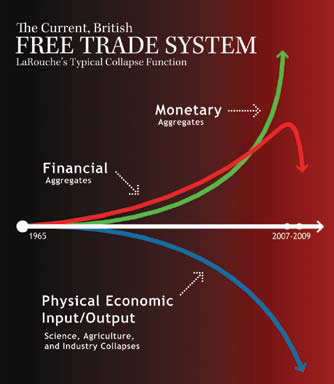 |
LaRouche has said this for a long time, but the decisive point at which he said that we were heading toward a systemic crisis was with the issue of his famous Triple Curve (Figure 1) in 1995, which shows the real economy going into a downward hyperbolic curve, while, on the upper coordinate system, two hyperbolic curves are rising, one for monetary aggregates, and the other for financial aggregates. And when these two top curves cross, and one [monetary aggregates] breaks away, as has happened in 2007, we have reached the point at which we are inexorably headed for a systemic crisis.
The international webcast that Lyndon LaRouche gave on July 25, 2007, will certainly go down in the history books; this was when he said, very dramatically, that the system is bankrupt. He said: The system is finished. Finito! All the banks' titles are worthless; there is zero possibility that a collapse will not occur; the system is finished; and what we are seeing now is how the individual aspects of this collapse are coming to the surface.
This was a historic intervention, because exactly three days later, the crisis broke out with the collapse of the so-called subprime real estate market in the United States, and since then, the crisis has gone through one phase after another.
But LaRouche did not leave it at that; as early as August 2007, he proposed a bill to Congress, known as the "Homeowners and Bank Protection Act," which essentially proposed that everyone who was in danger of foreclosure should remain in their homes, to prevent a social crisis; that the banks should be put under government protection; that their books would be closely examined to determine which claims were legitimate and which would have to be written off; and, above all, that the commercial banks would be provided with new credit so that the real economy could keep going.
This proposal at first found very strong support in the U.S. Congress. Had it been implemented, the crisis could have been stopped, and all the destruction that has occurred in the meantime would have been prevented.
Resolutions in support of this proposed bill were voted up in six American state legislatures and more than 100 cities, including large cities such as Philadelphia, Pittsburgh, and Detroit. And it failed only because Wall Street then sent top people to Congress to twist arms and blackmail people. Notably, it was Speaker of the House Nancy Pelosi, Rep. Barney Frank, and Sen. Chris Dodd who prevented the bill from going through.
Then, as everyone knows, all these bailout packages were cobbled together, the first on March 16, 2008. LaRouche immediately said that this was a violation of the Emergency Banking Act of 1933, which explicitly provides that only commercial banks may be rescued.
With each additional bailout package, whether the rescue of the Freddie Mac and Fannie Mae mortgage companies, or the huge TARP program, each time LaRouche said, energetically and dramatically, that it is absolutely illegal to spend tax money on worthless property titles, some belonging to foreign investors; that it is illegal, unconstitutional, and would immediately lead to hyperinflation. And then, he immediately demanded the return to a two-tier banking system. And of course, that point is completely absent in the report of the Financial Crisis Inquiry Commission. Since we were "bombing" the Congress and the state legislatures [with literature], it is absolutely impossible that nobody knows that.
The State Is Bankrupt
As a result of this failure to act, the United States is now facing sovereign bankruptcy. The municipalities are bankrupt; the cities are laying off police, firefighters, even releasing prison inmates early because there is not enough money to maintain them. But the situation in Europe does not look much better. The Maghreb is really in a process of a disintegration, and as for the developments in Egypt, which escalated in recent days with the incredible brutality of the Mubarak government, it is still a very open question where it will end.
We just spoke with important contacts in Greece, who told us that their country, which was forced by the EU to carry out this austerity policy, is headed for catastrophe. Politicians do not dare to cross the street, because people spit on them, and if politicians sit in a restaurant and are recognized, people pelt them with their restaurant bills, saying: "You pay it, you've been stealing from us!"
Naturally, the situation in Greece is really catastrophic. As a result of the austerity programs, there is now 18% unemployment and 3 million unemployed and illegal immigrants, with a total population of only 11 million.
 A trade union demonstration in Ireland, where the situation remains highly explosive. |
The situation in Ireland is also highly explosive. Parliament was just dissolved on Tuesday [Jan. 25], and there will be new elections. Gerry Adams, the leader of Sinn Féin, announced that he is calling on the people to defend Ireland against the assault by the banks and exploitation by the EU and the IMF.
It has reached the point where it is only a matter of time before Portugal, Spain, Belgium, Italy, and France also need bailout packages, and, ultimately, the six so-called Triple-A states—they would then be reduced to five, because France would quickly drop out of this category—will have to pay the entire cost.
The European Commission, the European Central Bank, and the IMF are demanding that the European Financial Stability Facility, which is currently headquartered in Luxembourg and administers this EU750 billion bailout fund, will be doubled, or maybe tripled, or quadrupled. And this is, of course, what is happening in America, which is simply printing money.
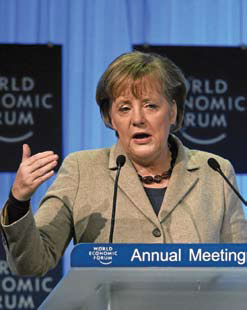 WEF/swiss-image.ch/Moritz Hager |
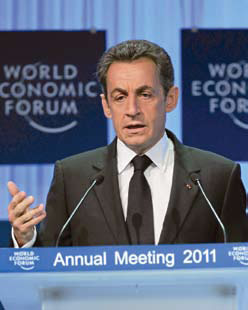 WEF/swiss-image.ch/Sebastian Derungs |
|
|
German Chancellor Angela Merkel (left) and French President Nicolas Sarkozy (right) agreed to cut their own throats (and everyone else’s) at the Davos forum on Jan. 27-28, pledging to uphold the common European currency at any cost. |
||
From this standpoint, it is completely absurd for President Sarkozy, and, unfortunately, also Chancellor Merkel to proclaim at Davos, that they are going to save the euro at any cost and will never allow it to fail—that makes about as much sense as the famous last words of [former East German communist leader] Erich Honecker, who said, on the 40th anniversary of the G.D.R.: "Neither an ox nor an ass can stop the progress of socialism," and exactly 12 days later, Honecker was no longer in office, and three weeks later the Berlin Wall came down.
Because we now have a breakdown crisis which is far worse than what occurred with the end of communism. If they keep printing all this money, and keep trying to refinance the debts, this money does not, of course, stay in the speculators' piggy banks, but rather the speculators head for the sectors that promise them the most profit. At the moment that means raw materials and agricultural commodities, and that leads to inflation, including for food prices, which have risen by 20% in India and Pakistan, for example.
For a person who has to spend 80 or 90% of his income on food, an increase like that can be fatal. That is the point: These bailouts are costing lives! Import prices in Germany rose last year by 12%, which is already quite a bit; but the raw material index put out by the Hamburg World Economic Institute—excluding energy, i.e., without gas and oil—rose 41% last year. As the saying goes, once you start to see inflation, it's already too late, because this is a process that takes on a life of its own.
We Need a Two-Tier Banking System!
So, what has to happen if we're going to stop it? There's only one solution, one that has to come from the United States, and then has to be taken up by Europe and the rest of the world: We must implement a two-tier banking system. An absolute firewall must be erected between the commercial banks which are responsible for issuing credit to industry, trade, and agriculture, and the investment banks which are engaging in high-risk speculation.
In other words, we must create a situation whereby investment banks no longer have access to citizens' savings and pension funds. And that's also the reason why, up to now, the City of London has been describing the Glass-Steagall legislation as a "casus belli"; we know from a well-informed source that this was the message conveyed along diplomatic channels. Because London's so-called "financial industry"—which, of course, has precious little to do with industry—owes its continued existence to precisely this coupling between commercial and investment banking.
I want to state this emphatically: When we're talking about a two-tier banking system, we're not talking about a mere technical adjustment; it's not a question of simply writing off the trillions of outstanding debt, clearing off the books, and then going back to business as usual.
Rather, it's going to be a fundamental change. There has to be a transition from the monetarist system currently dominating the world, in which money is imputed to have some intrinsic value, in which bankers claim they're more important than industry, in which debt is honored even though it's not backed up by any real value. This must be replaced with a credit system such as Alexander Hamilton established during the American Revolution, as Lincoln affirmed it, as Franklin Roosevelt revived it, and as we in Germany experienced it with the Kreditanstalt für Wiederaufbau [Reconstruction Finance Agency] during the post-World War II reconstruction. Namely, credits must be tied to real investments. That way, they're not inflationary, because they're issued as promises against future real production; and the credits that are issued in this form, create surplus value.
It's an established fact that every time this policy has been followed, future tax revenues are always greater than the credit initially issued, because they have the effect of not only financing the projects themselves, but also of inspiring and invigorating the entire economy—all branches of industry, from the baker to the hairdresser, from the screw manufacturer to the farmer. This system was introduced by Franklin Roosevelt in 1933, so there's an historical precedent for it.
This, of course, has to be tied to a system of fixed-currency exchange rates. There must be an absolute prohibition on speculators, such as George Soros, being able to drive a nation's currency down by 20%, 30%, 40% within a few days, and then reaping huge profits. And as part of the new credit system, we need long-term cooperation—treaties among sovereign governments for reconstructing the world economy.
Transforming the World with Great Projects
Now, over the past few months—and if you visit our websites, especially the American LaRouche PAC website, but also the BüSo's [http://bueso.de]—you can see that we have produced a whole slew of videos which should make it easier for people to get an idea of what such a reconstruction effort would look like.
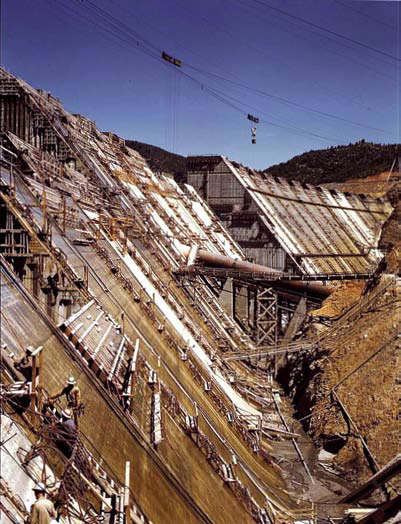 Library of Congress/Russell Lee The NAWAPA proposal calls for 369 water projects, including hundreds of new dams. Shown is the Shasta Dam in California, under construction in 1942. |
The centerpiece for America, for instance, would be the construction of the North American Water and Power Alliance (NAWAPA). This would be a gigantic water-management program, whereby 20% of the water from two rivers in Alaska and Canada, which is currently flowing unused into the Arctic Ocean and the Pacific, would be collected and then channelled through a giant conduit and canal system, down along the Rocky Mountains and into America's desert states, and then onward into Mexico.
This would accomplish a whole lot of amazing things. Not only could you irrigate the deserts of Nevada, New Mexico, and many other states along this route—i.e., you could start up abundant agriculture, gardens, and forests—but you would also be intervening into the Biosphere itself, since the plants that would start growing there, would develop into dense vegetation. And of course, whenever you have such dense vegetation, it would give off moisture which would then precipitate back down, and so you would be creating an entirely new weather cycle. In other words, you would be increasing the efficiency of the entire Biosphere.
This program would create 5 to 6 million new jobs, since, of course, it wouldn't be just this water project, but you would also have to build high-speed railways in order to develop the entire infrastructure—the Transrapid [maglev train] would be particularly suitable here, because there are some steep inclines to deal with. And it would also be the beginning of an entire infrastructure system, which then, with the construction of the tunnel connecting Alaska and Siberia, would connect up with the Trans-Siberian Railway, and this, in turn, connect to the building of the Eurasian Land-Bridge. In other words, we would basically be developing the entire interior of Eurasia, bringing it to a higher level of productivity.
This program is absolutely crucial, for example, for Germany's long-term energy and raw materials security, because Germany, like Japan, has practically no raw materials, and if we want to guarantee our raw materials requirements for the long term, we will need, for example, a cooperation agreement with Russia, whereby we can, under Russian aegis, participate in the development of the Arctic. Because this region contains all the elements of the Mendeleyev Periodic Table, and so it's an absolutely necessary investment in our future.
We would, of course, connect this program up with the African development program: The Eurasian Land-Bridge would then be extended through Egypt, through a bridge or tunnel from Sicily to Tunisia, and across the Strait of Gibraltar. And we would make a unified infrastructure program for Africa into a top agenda item.
A very important component of this, would be the construction of Transaqua, a program for diverting surplus water from the Congo River into Lake Chad, via a system of canals and riverways, in order to green and irrigate the entire Sahel region.
And then, of course, there's the crucial point that would be part of this new credit system and worldwide economic reconstruction program: namely that human creativity, and mankind, become the central feature of economics, since these are the sole source of all social wealth.
 U.S. National Archives |
In a few short years after its defeat in 1945, Germany was transformed from a rubble-field (below) into an economic miracle. The photo on the left shows reconstruction with aid from the U.S. Marshall Plan. | |
 Creative Commons/Deutsche Fotothek/Abraham Pisarek |
The British Empire's Role
Now, all these programs are already filed away in the drawers of engineering firms. NAWAPA was all ready to go back in 1964—a Congressional feasibility study was done on it. The Bering Strait project was worked out long ago by Russian geologists and other scientists. The Oasis Plan for irrigating all of the Mideast and Western Asia was conceived in 1975 by my husband, Mr. LaRouche. And ever since 1990, we've been proposing our plan for the Eurasian Land-Bridge, and have been elaborating on it since then. Since everything is ready to go, of course the question arises: Why have all these projects, which would so clearly improve the living conditions of people on this planet, not been realized? And that brings us to the absolutely crucial matter of the British Empire.
When we speak of the British Empire, we don't mean Great Britain, or the British people, or the British subjects of the United Kingdom, nor do we mean the people of the Commonwealth. Rather, by British Empire, we mean what is normally meant by globalization—i.e., the entire nexus of central banks, investment banks, hedge funds, stock brokerages, insurance and reinsurance companies, and food cartels which together control the so-called free market.
And it's a system which has continued to grow like a slime-mold, and actually got started on Aug. 15, 1971, when Richard Nixon dissolved the old Bretton Woods system which had been established by Roosevelt, replacing fixed exchange rates with flexible rates. And this was the real beginning of today's casino economy. Out of that came the eurodollar market, and credit started being created on islands beyond the reach of government authorities—the Cayman Islands, and others.
And it was at that moment, in August 1971, that Lyndon LaRouche said that if things continue along these lines, a new depression will be inevitable, along with the threat of a new kind of fascism. And he said that either we'll have a new depression and fascism—or else, a new and just world economic order.
And as you surely know already, the BüSo is not just a party in Germany, but we're part of a worldwide movement, born out of the recognition that humanity was moving in precisely the direction that we now find ourselves. And that's our very special significance.
Assault on Cultural Optimism
That moment also marked the beginning of what is known today as the Inter-Alpha Group. It started out in 1971, with an alliance of six small private banks—banks which, over the years, have become increasingly intertwined, and which today control approximately 70% of the entire financial system. And it's absolutely no accident that this period also marked the beginning of a paradigm shift toward speculation and away from scientific and technological progress, toward ecology and falsely conceived environmentalism, away from Classical culture, and into the counterculture. It was then that this paradigm shift was deliberately set into motion. It was an assault against the enormous cultural optimism which had distinguished the postwar period up to then.
Those among you who are older perhaps know this: It was, of course, the period following 1945, the 1950s, and into the 1960s. We weren't as wealthy as we became later on, but there was an absolute tidal wave of reconstruction. Within a few short years, Germany was transformed from a rubble-field into the German Economic Miracle. The heads of small and medium-sized industrial firms considered themselves to be the guarantors of the general welfare, and indeed they financed 80% to 95% of it. The famous virtues, which Joschka Fischer [of the Green Party] qualifies (or rather disqualifies) as "secondary virtues"—values such as diligence, productiveness, honesty—were taken for granted. And if someone declared bankruptcy, they were treated as washed-up for good; whereas a bankruptcy today is "business as usual"—you can go through one every other week. German postwar reconstruction
Back then, an altogether deliberate attack was launched against this paradigm, against the values that lay at the heart of Germany's reconstruction effort—values which characterized Chancellor Adenauer and French President de Gaulle, but also President Roosevelt, and, to a certain extent, Eisenhower and Kennedy as well. This cultural optimism, which was identified with the Apollo program, with the idea that man can conquer space, that science and technology can provide solutions to our problems, and with the idea that with the so-called UN "Development Decades," underdevelopment of the Third World can eventually be made a thing of the past—all this was the brunt of a deliberate attack, and these values were destroyed by means of social engineering—a completely deliberate change in our axioms.
If we are impelled to understand how humanity could have arrived at this point of potential catastrophe, then we must understand that it wasn't accidental; it didn't necessarily have to happen this way. Rather, it was the result of deliberate cultural warfare, a battle of ideas, the foremost objective being to destroy the positive image of man associated with Christianity, and the idea of man as infinitely capable of self-perfection, of man as a creative individual. This was to be supplanted by submission to the idea of man as a servile, dumbed-down creature who accepts the oligarchical system, and whose fate is predetermined by others.
And if we observe, for example, how a large part of the population has succumbed to this dumbing-down process, then what we're seeing now, is the result of that process. And if you want to stop it, you first have to get a mental picture of what it is.
The Congress for Cultural Freedom
After Germany was absolutely shattered in 1945, the new watchword was: "Euthanasia never again! Nazi crimes never again!" And out of the shock which people had experienced, there evolved a very important debate over the question of what laws could be passed to ensure that such things could never happen again.
 The great conductor Wilhelm Furtwängler. Musicians performed in bombed-out buildings in Germany after thte war, understanding the people’s tremendous yearning for Classical culture. |
There was an ongoing debate in Germany at the time over natural law, a debate which placed truly profound ideas onto the public agenda. And people also felt a natural need for Classical culture. Great conductors such as Furtwängler, and singers such as Schlusnus, organized spontaneous concerts in bombed-out factory buildings, because people felt a tremendous yearning for the beauty of Classical culture.
But right on the heels of that came an attack by the British Empire, or by one of its creations, namely the Congress for Cultural Freedom. This part of our history has receded much too far from our living memory. This Congress for Cultural Freedom functioned as a trans-Atlantic organization, only going out of existence in 1967, after it came out that it was entirely financed by the CIA and the U.S. State Department—with massive British input, of course. The CCF launched a systematic program to cut off the German population, the American population, Europe's population, from Classical culture, replacing Classical culture with modern music—12-tone music, atonal music. At the height of its influence, the CCF controlled 120 cultural journals and virtually all Classical concerts. So today, if you try going to a concert with the idea of actually hearing some Classical music, you've got to listen not only to Beethoven, but also to Berg and Shostakovich, and then some other moderns—a total grab-bag. That's one of the results.
One part of this program was the Frankfurt School, which also ran cultural warfare against Classical culture: Theodor Adorno, for example, who claimed that Friedrich Schiller and idealism necessarily led to fascism.
An entirely deliberate attack was carried out on the idea that there is a knowable truth that man can discover by means of successively more efficient hypotheses. And in its place, there entered liberalism, according to which everyone is entitled to their own opinion, and no one is permitted to say that something is true. And that, of course, pulled people away from recognizing universal principles, promulgating the idea that artistic and scientific creativity no longer had any significance.
The Birth of the Ecology Movement
This attack proceeded further in 1963, when Dr. Alexander King, who later became president of the Club of Rome, but, at that time, was an OECD education and science director in Paris, presented a report which stated that the entire Humboldt education system [see box] had to be abolished in the OECD countries—in other words, the entire educational ballast of the past 2,500 years of Greek, Italian, and German Classics should be junked: Socrates, Plato, Beethoven—all this had to go, to be supplanted by practically oriented, sociological subjects, directly useful in industry.
 Wilhelm von Humboldt, one of the great minds of the 19th Century, designed a Classical educational program for all citizens, rich and poor. The idea spread to other countries in Europe, the United States, and Japan.. |
The Humboldt Program
Wilhelm von Humboldt (1767-1835) was a Prussian philosopher and linguist. These quotes are from his universal curriculum for Königsberg (see Marianna Wertz, “The Classical Curriculum of Wilhelm von Humboldt.”)
Fidelio, Summer 1996, http://schillerinstitute.org/fid_91-96/962_humboldt_education.html
I . . . deny the possibility of purposefully setting up an essentially different establishment for future craftsmen, and it is easily shown, that the gap resulting from the lack of trade schools, can be completely filled by other establishments. . . .
The general principle should be: In any school, always to strive for the full and faultless exercise of the principal powers of the mind; to exclude from scholastic education any body of factual knowledge which—however necessary it may be—fosters those powers very little or too onesidedly; and to reserve the specialized schools for practical life. . . .
Everyone, even the poorest student, would receive a full education . . . each individual intellect would be done justice. . . .
This attack on Classical culture and on the Humboldt education system led to a situation where people—or at least the vast majority of people—were no longer capable of judging whether a particular policy was a forward step, or a setback for humanity. Now, suddenly, pluralistically, everything was permitted. The next step was Chancellor Willy Brandt's education reform, along with similar reforms in the other OECD countries, whereby their Classical educational heritage was trashed.
The next step after that, was the Rappaport Report, published in 1967, which asserted explicitly, that some way must be sought to ruin young people's cultural optimism: No longer must they be led to believe that problems can be solved by advances in science and technology; and all enthusiasm for space travel had to be quashed.
 EIRNS/James Rea An anti-nuclear demonstration in Dannenberg, Germany, Nov. 6, 2010. Since the paradigm shift of the 1960s, belief in scientific progress has been ditched in favor of ill-conceived environmentalism. |
This paved the way for the next escalation: the massive wave of international propaganda unleashed by the Club of Rome and MIT, which put the book Limits to Growth on the market. This presented the idea that the universe had developed up until the year 1970, but that it had now reached its limit as a closed system, and that some state of equilibrium had to be found, because development had continued, asymptotically, to this upper limit, so that now, of course, we all had to cut back—cut back on raw materials, and reduce our population. The authors of this book, Meadows and Forrester, admitted later on, that this had been a fraud: They had simply fed data into a computer, got some results, and then adjusted their model so that it produced the desired results.
But what happened, was that the entire ecology movement sprang into being. Suddenly, the image of man was transformed. No longer was man the pinnacle of Creation; rather, he was a parasite, a polluter, a burden on a world increasingly bereft of raw materials. And this was carried one step further by Henry Kissinger, who, in 1974, issued his infamous NSSM-200 document, which declared all of the world's raw materials resources to be in the strategic interest of the United States, and that the United States had the right to punish those countries that had not done enough to reduce their populations, by using the food weapon against them, raising prices of bread and other basic foodstuffs, in order to destabilize these regimes.
It's interesting that one of the countries that Kissinger named was Egypt; and as everyone knows, whenever you raise the price of bread in Egypt by even 10%, you're preprogramming revolts in the streets.
What was set into motion with this paradigm shift, was the idea that the world is overpopulated; whereas before that time, it had been assumed that the main problem was underdevelopment. Such concepts as "appropriate technologies" and "sustainable development" were coined, and these are merely Orwellian "doublespeak" for condemning the Third World to perpetual poverty, hunger, and reduced life expectancy.
And all for what? All, of course, because a small, privileged elite wanted to ensure that consumption of raw materials would be limited, because if there were too many people wanting to develop, so they said, those raw materials would be threatened.
And it's in these developments, which I can only sketch out roughly here, in this paradigm shift, that we locate the cause of civilization's existential crisis that we're going through right now.
If you ask yourself how it could be that Germany developed the high-temperature nuclear reactor, developed the Transrapid, but didn't build these here, but rather in China and other places—this is the result of this British imperial warfare against Germany.
The Task of Mankind Is Progress
Now, I would like to counterpose what we must do if we want to prevent the collapse of humanity. In fact, we have to start with a realistic view—and that is, from the top down. How is the physical universe really created? What are the laws of the universe?
Then it can be established that, long before mankind appeared in evolution, the dominant principle of the universe was creativity. The universe continually develops itself to higher orderings; new solar systems arise; new galaxies arise; a higher energy-flux density arises in the universe, completely independent of mankind's role. And this will continue indefinitely, in spite of the current aberrations in which our planet finds itself. In the study of the physical universe, one can determine continually higher stages of complexity, which develop from one another anti-entropically, and take place at ever higher energy-flux densities which operate in the universe.
Lyndon LaRouche—and this is perhaps one of the many things for which he will be remembered in history—has described the concept of "relative potential population density," as the measuring rod which defines, absolutely scientifically, whether a development is good or bad.
This signfies that at any technological stage, the resources, the raw materials, are always limited. Had mankind remained at the level of hunters and gatherers, then whenever the roughly 5 million human beings living at that period would at have consumed all the bears, hunted all the rabbits, eaten up all the mushrooms, then an ecological catastrophe would have resulted, and the human race would have collapsed.
But since man's identity represents the creative principle, man developed agriculture; and, in subsequent history, he developed other things to use, such as fossil energy sources; he developed steam-powered machinery; he developed the railroad; he developed nuclear power; he has continually been able to attain higher energy-flux densities in production processes, and thus to raise the population potential on the Earth from perhaps 5 million at that period, to about 7 billion today. There is also no reason at all why this should come to an end; rather, if humanity creates the next steps, this process will absolutely continue.
 Creative Commons/Nick in exsillo The creative genius Cardinal Nicolaus of Cusa (1401-64); relief from his memorial in the Basilica di S. Pietro in Vincoli, Italy. |
This all reflects the fact that Cardinal Nicolaus of Cusa, the great thinker of the 15th Century, the founder of modern natural science and the sovereignty of nation-states, was correct when he developed what in retrospect can be called the "biogenetic law of evolution"; namely, when he distinguished among the inorganic substrata of the Earth; the organic world—what we now call the Biosphere; human reason, which Vernadsky named the Noösphere; and what Nicolaus defined as the fourth level: that is, God the Creator, Who represents the development of this principle, and Who, according to Nicolaus of Cusa, sets man apart as the "imago viva Dei," the living image of God, who carries on this creative process.
It is astonishing that a Cardinal in the 15th Century already thought that way. He said that man, when replicating this most noble capacity of the Creator, becomes a second God, because man then self-consciously carries forward the "vis creativa," the creative power, which is inherent in this order of Creation. Nicolaus went so far as to say that since mankind developed, Creation is continued through mankind alone; that it is man who drives the further development of the universe.
This is naturally a different concept of man, which implies that development does not come from below—and thus not, as Darwin says, by the survival of the fittest, which eliminate the weaker—but rather from above. He says that no genus and no species fully expresses its nature if it does not, at least at some point, participate in the next higher species; and he even says that the lower species are pulled upwards by the higher; that each human being recapitulates the entire development of the universe in his or her own development, and can consciously find the next step of development on the basis of this knowledge.
Thus, I find that these are tremendous thoughts for the 15th Century, and they later defined the work of Kepler, Vernadsky, Einstein, and all modern science. That is, the reason that man is in the position to describe the physical universe, lies in the fact that the laws of creative thought, the microcosm, are in absolute concordance with the laws of the physical universe, and produce a harmonic resonance in the soul of man.
According to Nicolaus, the soul is the location in which evolution takes place, for the soul—one could also say, the creative spirit—is where science, music, and many other things are found, which, because they are eternal—because they have an eternal character—show that the human soul is also immortal. Because obviously the creative principle which produces these sciences, is of a higher nature than the sciences it invents.
If one thus observes the universe from above, the principle of creativity is ontologically primary. Nicolaus described this, for example, in his term "coincidentia oppositorum," the "coincidence of opposites"; that is, that the One has a higher truth and quality than the Many. And that is a dynamic concept, because harmony in the macrocosm is only possible through the best possible development of all microcosms.
If we now pose the question: What is the purpose of mankind? What is the role of mankind in this physical, self-developing universe? Are we here only as the beneficiaries of limited resources; are we parasites; or are we called upon in our human development to replicate the laws of the universe? This is something that Friedrich Schiller defined, for example, in his famous writing on "The Legislation of Lycurgus and Solon." He says that Solon, the wise lawgiver of Athens, when asked "What is the purpose of mankind?," replied,"Progress"—the progress of man, or the bringing of mankind to ever greater dominion in the universe, to an ever greater unfolding of his creativity. And this is unlimited.
Why We Need Classical Culture
 Germany’s “poet of freedom,” Friedrich von Schiller (1759- 1805): The purpose of mankind is progress, the greater and greater unfolding of creativity. |
 EIRNS/Sergei Strid The BüSo chorus performs Beethoven’s “Choral Fantasy” at the Berlin congress on Jan. 29. |
 USMC/Lance Cpl. Chris Kutlesa The bestiality of the modern counterculture can be summed up by the words “Lady Gaga.” |
This brings us to the question of why we think so highly of Classical art. Art is not, as Kant says—in opposition to Friedrich Schiller—at its most beautiful, when an artist tosses a random Arabesque onto the wall; this art is more beautiful, according to Kant, than when one can recognize the plan of the artwork in the art itself. Schiller absolutely rejects this, saying no, it is exactly the plan of the artist, who wants his art to have a unique purpose, and that is the ennoblement of mankind.
The question one must put to oneself is, what role does culture play in this process of development? Does culture lead to the advancement of mankind, so that it develops, unfolds, becomes nobler, more beautiful, strives higher? Or is its effect, rather, that man is pulled downward, and the bestial side is strengthened?
And one must say very definitely that the culture, or better the non-culture, which has accompanied globalization, has degraded mankind. I don't want to detail this further, but just to select one name for it: Lady Gaga. Because Lady Gaga is definitely "ga-ga," and the goal behind this is, that those who submit to it, tend to become lunatics themselves.
Why is Classical music so important? Classical composition—and equally whether you are talking about literature, poetry, architecture, or music—begins with a poetic or musical idea, which is then thoroughly composed according to absolutely strict rules, leading to a growing number of singularities, which the person who is engaged with this Classical culture can recognize and grasp as a totality.
This means that preoccupation with this Classical culture shapes the mind to think and feel this way; and if man develops in such a way, the result, as Friedrich Schiller anticipated and demanded, is that the adult willingly finds freedom in necessity, and does his or her duty with passion, and then even becomes a beautiful soul, which Friedrich Schiller identified as the person who uniquely has the potential to become a genius.
Thus, what we need is not only a new international economic order, a new world currency system; we also need fundamentally a new culture, a Classical Renaissance.
Just as this investigative commission was formed on the causes of the financial crisis, so we need an investigative commission on what has gone so terribly wrong with the culture of the entire post-war period. This would reveal the things that I have just sketched out, because we have really performed this function throughout our existence as a movement, pointing to exactly these undesirable trends.
Looking at the entire process of destruction of Classical culture, start with Romanticism, which attacked Classical culture absolutely deliberately, a destructive process which has turned into today's deconstructionism, Gaga, and the fundamental and complete loss of meaning; it was promoted after the Second World War by the Congress for Cultural Freedom, the Frankfurt School, the entire counterculture; one has to conclude that culture is not a matter of personal taste, but rather, the question is: Does the culture promote man's creativity, or make him a zombie who passively submits himself to Dionysian mass movements, as can be seen at rock concerts?
A Turning Point in History
We have thus come now to a turning point in history. If it should turn out that mankind is incapable of correcting the failed policies of, especially, the last 40 years—then it is clear that we will plunge into a dark age, and that the result will be a French Revolution, in which violence, terror, and despair will spread. And when more and more people, above all, young people, see no future, then it is clear that this will end in chaos, as we can see that now in Egypt; and that then the shrinking world population will be controlled by bands which alone can assert themselves amidst hunger revolts.
The alternative is perfectly clear: Glass-Steagall, a two-tier banking system, the World Land-Bridge for the reconstruction of the world economy, the NAWAPA concept, the Bering Strait crossing, the Eurasian Land-Bridge, the Transaqua project, the extension of the World Land-Bridge into Africa. Then mankind will reach what LaRouche has called a "platform" for economic development; that is, the next platform, meaning that at a certain level of development, all of the processes in these economic events are dependent upon one another.
For example, when human civilization was, so to speak, still one of hunters and gatherers, settled on the coasts and along the rivers, that was one platform which human life had established. One could say that the development of a system of inland canals defined the next platform; that was essentially by Charlemagne, who connected the rivers in Europe by canals, and thereby, enlarged the scope for development of the landlocked regions, which naturally led to greater development; then, the next platform, which was characterized by railway systems; and naturally, if we were now to go on further and develop the World Land-Bridge, which you have all seen in various of our publications—in other words, infrastructure that, above all, provides the interior regions of the continents with the same regional economic conditions which now, for example, only the well-developed regions like the Ruhr or Baden-Württemberg have—then we would bring about the higher evolution of mankind by a whole qualitative leap.
Krafft Ehricke’s Vision
The late Krafft Ehricke (1917-84), space scientist and passionate advocate for space exploration, summarized his philosophy of astronautics in three laws (1957):
First Law. Nobody and nothing under the natural laws of this universe impose any limitations on man except man himself. Second Law. Not only the Earth, but the entire Solar System, and as much of the universe as he can reach under the laws of nature, are man’s rightful field of activity. Third Law. By expanding through the universe, man fulfills his destiny as an element of life, endowed with the power of reason and the wisdom of the moral law within himself.
The first law is astronautics’ challenge to man to write his declaration of independence from a priori thinking, from uncritically accepted conditions, in other words, from a past and principally different pre-technological world clinging to him. This can be done. The Declaration of Independence and the Constitution of this country prove it.
—Cited in Marsha Freeman, How We Got to the Moon: The Story of the German Space Pioneers (Washington, D.C., 21st Century Science Associates, 1993), p. 297.
|
NASA Krafft Ehricke with a model of an orbital hospital. |
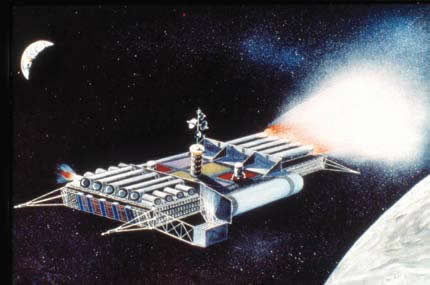 Krafft Ehricke Painting of a nuclear freighter for industrialization of the Moon, by Krafft Ehricke. |
This would be an intervention into the Biosphere as well. Mankind would qualitatively raise the efficiency of the Biosphere. The next level would naturally be the development of manned space travel, fundamentally, because there we would have to solve the kind of scientific challenges that are mandatory for mankind to become rational and reasonable. The great German scientist of space travel, Krafft Ehricke, called this evolution the "extraterrestrial imperative," meaning that, fundamentally, manned space travel is the natural next level of civilization. These are matters that will not have immediate results; thus, for example, we still have tremendous challenges to solve before we can colonize Mars. But if we decide to do this in this century—thus, in perhaps three or four generations—we must set the course for it now, thus defining the basic direction.
Then mankind would leave its present infantile stage, and one could say with certainty that human beings would no longer be spoiled little children carrying out their irrational wishes in an infantile way, but were creative young adults, making mankind into what it should really be, namely creative individuals. And I believe that that is a goal that is absolutely worth fighting for.
We are now at this watershed: a plunge into a dark age, or a new Renaissance, a new epoch of mankind. And I cordially want to invite everyone to work with us for this.
[1] See "BüSo Party Congress: LaRouche Movement Launches Campaign for Germany," EIR, Feb. 11, 2011, p. 49, for a report on the BüSo candidates, including Stefan Tolksdorf's campaign for Mayor of Berlin.
Related pages:

